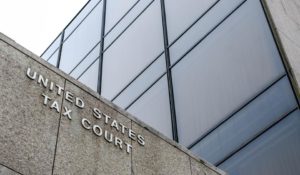U.S. Tax Court forgoes penalties for Rockland lawyer
Though nothing in this world can be said to be certain, except death and taxes, a Rockland lawyer has managed to escape a bit of one of those realities.
U.S. Tax Court ruled on May 30 that Donald S. Tracy, 92, doesn’t have to pay penalties on employment taxes he had failed to pay for 21 months.

Tracy was sole proprietor of a law firm in New City for 60 years. From late 2017 to mid 2019, he was in the process of closing his practice because of declining health and advanced age.
He was nearly deaf. A worsening back injury and joint disease in his knees and hips made it difficult to maintain balance. He suffered from atrial fibrillation, hypertension and cardiopulmonary disease. And he was caring for his dying wife of 55 years.
A part-time aide looked after his grocery shopping, laundry, cooking, cleaning and errands.
As he was taking steps to close the office, another attorney worked on his cases, a long-time assistant helped with bookkeeping and payroll, and another assistant handled employment taxes.
The assistant handling the taxes knew that the firm’s income was declining and she was feared losing her job, according to tax court, and she did not perform her duties.
Tracy was unaware that his assistant had shirked her duties. When he did learn of the problem, the ruling states, he promptly filed the tax forms and paid the taxes.
He complied with the certainty of paying employment taxes, but he did not pay the penalties for late filings and late payments. Instead, he asked the IRS to abate the fees.
The Internal Revenue Service issued a notice in August 2021 for unpaid penalties. Tracy challenged the action, and an IRS settlement officer determined that he had not established reasonable cause for abatement.
The issue for U.S. Tax Court was whether Tracy’s failures to file tax returns and pay taxes within the prescribed time was due to reasonable cause or willful neglect.
Tracy represented himself before the court, and the burden of proof was on him.
He had to show that he had exercised ordinary business care and prudence but nonetheless was unable to file tax forms and pay taxes in time.
A taxpayer who continues to operate a business despite illness or incapacity is not prevented from performing tax obligations, the court said. And the failures cannot be excused by reliance on an agent.
Despite his failing health and advanced age, the court said, he was diligent and prudent in operating his business.
He had systems in place to ensure tax compliance that had not failed him for nearly six decades, so it was “reasonable, and not willfully negligent,” for Tracy to trust the systems’ reliability.
And it was not reliance on his assistant that caused the failures, the court found, but his inability to adequately supervise her due to his failing health and advanced age.
Tracy acted quickly when he discovered that he was out of compliance, the court said.
“Had he been able to supervise his assistant properly, (he) would have ensured that the returns were filed.”